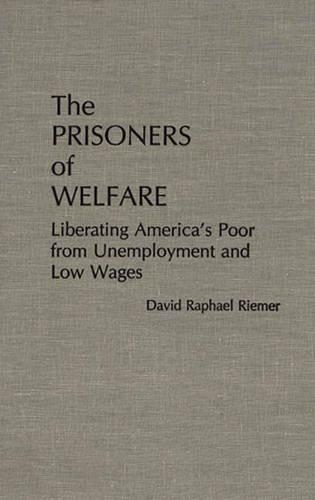
The Prisoners of Welfare: Liberating America's Poor from Unemployment and Low Wages
(Hardback)
Publishing Details
The Prisoners of Welfare: Liberating America's Poor from Unemployment and Low Wages
By (Author) David Riemer
Bloomsbury Publishing PLC
Praeger Publishers Inc
6th October 1988
United States
Classifications
Tertiary Education
Non Fiction
Social and cultural history
361.973
Physical Properties
Hardback
219
Description
Every year, the welfare system in America absorbs billions of dollars--money that could be used to eliminate poverty by creating jobs and subsidizing wages. The Prisoners of Welfare proposes a comprehensive alternative to America's fundamentally flawed welfare system with detailed, specific strategies. Riemer's proposals for revamping existing social support systems include an analysis of the roles of state and federal governments--proving a valuable resource for academics in public policy, labor studies, and social policy, and a blueprint for reform-minded government officials. Every year, the welfare system in America absorbs billions of dollars--money that could be used to eliminate poverty by creating jobs and subsidizing wages. The Prisoners of Welfare proposes a comprehensive alternative to America's fundamentally flawed welfare system with detailed, specific strategies. Riemer's proposals for revamping existing social support systems include an analysis of the roles of state and federal governments--proving a valuable resource for academics in public policy, labor studies, and social policy, and a blueprint for reform-minded government officials.
Reviews
The poor are poor because SSI and Social Security are not designed to eliminate poverty, because there are not enough jobs, and because too many jobs pay too little.' The author attempts to illustrate the validity of this statement through the presentation of data; Riemer then proceeds to offer a solution that he estimates will cost $10 billion net. This solution to poverty provides a guaranteed annual income to those who are unable to work owing to disability or age; a community service job to the able-bodied unemployed; and a wage supplement to the working poor. These three tiers of his antipoverty plan coupled with health insurance and appropriate' day care would liberate the prisoners of welfare.' As with most solutions explained in fewer than 200 pages, a lot of details are omitted. The thesis that there are insufficient wellpaying jobs to go around is accurate. . . . This work is recommended for its stimulating and thought-provoking treatment. . . . Academic and public library collections.-Choice
The Prisoners of Welfare, by David Raphael Riemer, is an innovative and insightful examination of America's welfare system that is sure to provoke discussion in the college clasroom and debate in the academic literature . . . this is a solid piece of work that students, academics, and the general public alike will find interesting and stimulating-Perspective
"The Prisoners of Welfare, by David Raphael Riemer, is an innovative and insightful examination of America's welfare system that is sure to provoke discussion in the college clasroom and debate in the academic literature . . . this is a solid piece of work that students, academics, and the general public alike will find interesting and stimulating"-Perspective
"The poor are poor because SSI and Social Security are not designed to eliminate poverty, because there are not enough jobs, and because too many jobs pay too little.' The author attempts to illustrate the validity of this statement through the presentation of data; Riemer then proceeds to offer a solution that he estimates will cost $10 billion net. This solution to poverty provides a guaranteed annual income to those who are unable to work owing to disability or age; a community service job to the able-bodied unemployed; and a wage supplement to the working poor. These three tiers of his antipoverty plan coupled with health insurance and appropriate' day care would liberate the prisoners of welfare.' As with most solutions explained in fewer than 200 pages, a lot of details are omitted. The thesis that there are insufficient wellpaying jobs to go around is accurate. . . . This work is recommended for its stimulating and thought-provoking treatment. . . . Academic and public library collections."-Choice
Author Bio
DAVID RAPHAEL RIEMER is Director of the Department of Budget and Management Analysis for the City of Milwaukee, Wisconsin.
